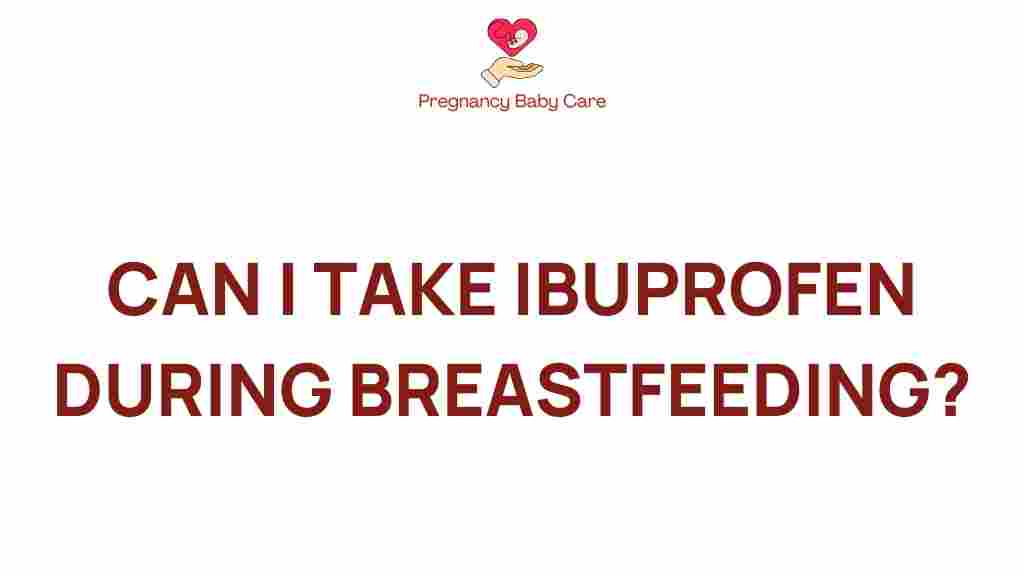Is It Safe to Take Ibuprofen While Breastfeeding?
When it comes to managing pain and discomfort, many nursing mothers find themselves questioning the safety of various medications. One common over-the-counter medication is ibuprofen, often used for pain relief. In this article, we will explore the relationship between ibuprofen and breastfeeding, focusing on medication safety, infant health, and health guidelines for nursing mothers. Understanding these aspects is essential for ensuring both the mother’s comfort and the baby’s safety during the breastfeeding journey.
Understanding Ibuprofen
Ibuprofen is a nonsteroidal anti-inflammatory drug (NSAID) commonly used to reduce fever, pain, and inflammation. It is effective for various conditions, including headaches, menstrual cramps, toothaches, and muscle aches. For nursing mothers, managing pain safely while breastfeeding is crucial, as certain medications can affect infant health.
Medication Safety During Lactation
When considering medication safety for nursing mothers, it’s important to recognize how drugs can transfer into breast milk. The American Academy of Pediatrics (AAP) classifies medications based on their safety during lactation. Fortunately, ibuprofen is generally considered safe for nursing mothers. Here’s why:
- Low Transfer Rate: Studies show that only a small amount of ibuprofen enters breast milk, making it unlikely to affect the infant.
- Short Half-life: Ibuprofen has a short half-life, meaning it is metabolized quickly by the body, reducing potential exposure to the infant.
- Recommended Dosage: When taken at the recommended dosage, ibuprofen is deemed safe for short-term use during breastfeeding.
Health Guidelines for Nursing Mothers
Nursing mothers should always consult with their healthcare provider before starting any new medication, including ibuprofen. Here are some key health guidelines to follow:
- Consult Your Doctor: Always discuss with your healthcare provider any medications you plan to take while breastfeeding.
- Follow Dosage Instructions: Stick to the recommended dosage to minimize any risk to your infant.
- Monitor Your Infant: Watch for any unusual symptoms in your baby after taking ibuprofen, such as excessive sleepiness or irritability.
- Consider Timing: If you are concerned, consider taking ibuprofen right after breastfeeding to reduce any potential exposure during the next feed.
Step-by-Step Process: Taking Ibuprofen While Breastfeeding
If you decide to take ibuprofen, follow these steps to ensure safety:
- Consult Your Healthcare Provider: Discuss your health condition and the need for pain relief.
- Evaluate the Need: Assess whether you really need medication or if alternative pain relief methods are available.
- Choose the Right Dosage: If approved, use the lowest effective dose for the shortest duration possible.
- Time Your Doses: Consider timing your doses after breastfeeding sessions to lessen the risk of the baby receiving the medication through breast milk.
- Monitor for Side Effects: Be vigilant for any signs of adverse reactions in your infant.
Common Concerns About Ibuprofen and Breastfeeding
Many nursing mothers have concerns about the safety of ibuprofen for their infants. Here are some common questions and the truths behind them:
1. Will Ibuprofen Affect My Milk Supply?
Research indicates that ibuprofen does not significantly impact milk supply. However, if you experience side effects or discomfort, consult your healthcare provider.
2. Can I Take Ibuprofen for Extended Periods?
While occasional use is generally safe, prolonged use should be monitored by a healthcare provider to avoid any potential complications.
3. What If I Forget to Space Out Doses?
In case of accidental overlap in doses, avoid taking additional medication until the next scheduled time. Monitor your infant for any unusual symptoms.
Alternative Pain Relief Options During Breastfeeding
If you prefer to avoid ibuprofen or if it is not suitable for you, there are alternative pain relief methods:
- Acetaminophen: Generally considered safe during breastfeeding, it can be an effective alternative for pain relief.
- Cold Compresses: For localized pain, cold packs can provide relief without medication.
- Hydration and Rest: Staying hydrated and getting adequate rest can help alleviate mild discomfort.
- Physical Therapy: For chronic pain, consulting a physical therapist may provide non-medication options for relief.
Frequently Asked Questions
1. Is Ibuprofen Safe for Newborns?
Ibuprofen is generally not recommended for infants under six months of age unless directed by a physician. Always consult your child’s healthcare provider for advice.
2. What About Other NSAIDs?
Other NSAIDs may have similar safety profiles, but always check with your healthcare provider before use.
3. How Long After Taking Ibuprofen Can I Breastfeed?
Due to its short half-life, you can safely breastfeed soon after taking ibuprofen. However, spacing it out after feeding may provide peace of mind.
Troubleshooting Tips for Nursing Mothers
If you experience any issues while taking ibuprofen during breastfeeding, consider the following troubleshooting tips:
- Track Symptoms: Keep a log of any symptoms you or your infant experience after taking ibuprofen.
- Consult a Lactation Consultant: If you have concerns about breastfeeding while taking medication, a lactation consultant can provide personalized advice.
- Switch Medications: If ibuprofen causes any side effects, discuss alternative options with your healthcare provider.
- Evaluate Non-Medication Options: Consider non-pharmaceutical methods to manage pain, such as relaxation techniques or gentle exercises.
Conclusion
In conclusion, taking ibuprofen while breastfeeding is generally considered safe for nursing mothers when used as directed. The low transfer rate into breast milk and the short half-life of the medication contribute to its safety profile. However, it’s crucial for nursing mothers to consult with their healthcare provider before starting any medication, including ibuprofen. By following health guidelines and monitoring both your own and your infant’s health, you can effectively manage pain while ensuring the safety and well-being of your baby.
For more information on breastfeeding and medication safety, visit this resource.
To explore further about breastfeeding and pain management, check out this article.
This article is in the category Health and created by PregnancyBabyCare Team
